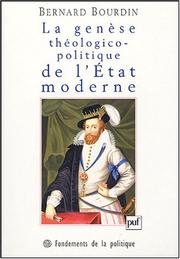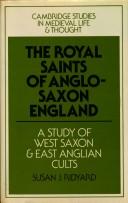| Listing 1 - 5 of 5 |
Sort by
|
Book
ISBN: 3412618713 9783412618711 Year: 1971 Volume: 19 Publisher: Köln: Böhlau,
Abstract | Keywords | Export | Availability | Bookmark
 Loading...
Loading...Choose an application
- Reference Manager
- EndNote
- RefWorks (Direct export to RefWorks)
Anglo-Saxons --- Monarchy --- Kings and rulers --- History --- Great Britain --- Politics and government --- Constitutional history, Medieval. --- Kings and rulers. --- Constitutional history, Medieval --- Kingdom (Monarchy) --- Executive power --- Political science --- Royalists --- Anglo-Saxons - Kings and rulers --- Monarchy - England - History - To 1500 --- Great Britain - Politics and government - 449-1066

ISSN: 12428124 ISBN: 2130529372 9782130529378 Year: 2004 Volume: *24 Publisher: Paris: Presses Universitaires de France,
Abstract | Keywords | Export | Availability | Bookmark
 Loading...
Loading...Choose an application
- Reference Manager
- EndNote
- RefWorks (Direct export to RefWorks)
Cardinals --- Church and state --- Cardinaux --- Eglise et Etat --- Attitudes --- James --- Bellarmino, Roberto Francesco Romolo, --- England --- Angleterre --- Kings and rulers --- Rois et souverains --- Political theology --- Monarchy --- History. --- Religion and politics --- Europe --- History --- 17th century --- Christianity and politics --- Attitudes. --- Political theology - History. --- Monarchy - England - History. --- Church and state - England - History. --- RELIGION ET ETAT --- ROBERT BELLARMIN (SAINT), 1542-1621 --- JACQUES I, ROI D'ANGLETERRE (1566-1625) --- PHILOSOPHIE POLITIQUE --- EGLISE ET ETAT --- GRANDE-BRETAGNE --- PENSEE POLITIQUE ET SOCIALE --- 17E SIECLE

ISBN: 0521307724 0521088100 0511560184 0511870515 9780521307727 9780511560187 9780521088107 Year: 1988 Volume: 9 Publisher: Cambridge : Cambridge university press,
Abstract | Keywords | Export | Availability | Bookmark
 Loading...
Loading...Choose an application
- Reference Manager
- EndNote
- RefWorks (Direct export to RefWorks)
Within Anglo-Saxon England there was a strong and enduring tradition of royal sanctity - of men and women of royal birth who, in an age before the development of papal canonisation, came to be venerated as saints by the regional church. This study, which focuses on some of the best-documented cults of the ancient kingdoms of Wessex and East Anglia, is a contribution towards understanding the growth and continuing importance of England's royal cults. The author examines contemporary and near-contemporary theoretical interpretations of the relationship between royal birth and sanctity, analyses in depth the historical process of cult-creation, and addresses the problem of continuity of cult in the aftermath of the Norman Conquest of 1066. An understanding therefore emerges of the place of the English royal saint not only in Anglo-Saxon society but also in that of the Anglo-Norman realm.
Christian church history --- Great Britain --- Christian saints --- Monarchy --- Anglo-Saxons --- Princesses --- Princes --- Cult --- History --- Kings and rulers --- England --- Church history --- -Princesses --- -Christian saints --- -Anglo-Saxons --- -Monarchy --- -Kingdom (Monarchy) --- Executive power --- Political science --- Royalists --- Saxons --- Saints --- Canonization --- Royalty --- Courts and courtiers --- -History --- -Kings and rulers --- -England --- Kings and rulers. --- -Cult --- -Princes --- Angleterre --- Anglii︠a︡ --- Inghilterra --- Engeland --- Inglaterra --- Anglija --- -Christian church history --- Kingdom (Monarchy) --- Anglo-Saxon period, 449-1066 --- Princes and princesses --- Arts and Humanities --- Christian saints - Cult - England - History - Middle Ages, 600-1500 --- Monarchy - England - History - To 1500 --- Anglo-Saxons - Kings and rulers --- Princesses - Great Britain --- Princes - Great Britain --- England - Church history - 449-1066
Book
ISBN: 0520014014 9780520014015 Year: 1970 Publisher: Berkeley (Calif.): University of California,
Abstract | Keywords | Export | Availability | Bookmark
 Loading...
Loading...Choose an application
- Reference Manager
- EndNote
- RefWorks (Direct export to RefWorks)
Christian saints --- Paganism --- Monarchy --- Cult --- History of doctrines --- History --- Great Britain --- Kings and rulers --- Religious aspects --- Anglo-Saxons --- -Christian saints --- -Monarchy --- -Paganism --- -Civilization, Pagan --- Heathenism --- Religions --- Kingdom (Monarchy) --- Executive power --- Political science --- Royalists --- Saints --- Canonization --- Saxons --- -Religious aspects --- -History of doctrines --- -Congresses --- -History --- -England --- Church history --- -Kings and rulers --- -Religious aspects. --- Civilization, Pagan --- Kings and rulers&delete& --- England --- Religious aspects. --- Christian saints - Cult - History of doctrines - Middle Ages, 600-1500 --- Paganism - England - History - To 1500 --- Monarchy - England - History - To 1500 --- Great Britain - Kings and rulers - Religious aspects

ISBN: 9780521126441 9780521803502 9780511289200 0511289200 0521803500 0511288522 9780511288524 9780511495595 1107174260 1280917210 9786610917211 0511290403 0511322410 0511289804 0511495595 9780511290404 0521126444 Year: 2007 Volume: 67 Publisher: Cambridge [UK] ; New York : Cambridge University Press,
Abstract | Keywords | Export | Availability | Bookmark
 Loading...
Loading...Choose an application
- Reference Manager
- EndNote
- RefWorks (Direct export to RefWorks)
This book is a comprehensive study of political thought at the court of King Alfred the Great (871-99). It explains the extraordinary burst of royal learned activity focused on inventive translations from Latin into Old English attributed to Alfred's own authorship. A full exploration of context establishes these texts as part of a single discourse which placed Alfred himself at the heart of all rightful power and authority. A major theme is the relevance of Frankish and other European experiences, as sources of expertise and shared concerns, and for important contrasts with Alfredian thought and behaviour. Part I assesses Alfred's rule against West Saxon structures, showing the centrality of the royal household in the operation of power. Part II offers an intimate analysis of the royal texts, developing far-reaching implications for Alfredian kingship, communication and court culture. Comparative in approach, the book places Alfred's reign at the forefront of wider European trends in aristocratic life.
Anglo-Saxons --- Monarchy --- Kings and rulers --- History --- Alfred, --- Political and social views --- Great Britain --- Politics and government --- Kingdom (Monarchy) --- Executive power --- Political science --- Royalists --- Aelfred, --- Alfred the Great, --- Political and social views. --- Kings and rulers. --- Anglo-saxons --- Monarchie --- Rois et souverains --- Histoire --- Grande-Bretagne --- Politique et gouvernement --- Alfredus Magnus --- Arts and Humanities --- Anglo-Saxons - Kings and rulers --- Monarchy - England - History - To 1500 --- Alfred, - King of England, - 849-899 - Political and social views --- Great Britain - Politics and government - 449-1066 --- Great Britain - History - Alfred, 871-899 --- Alfred, - King of England, - 849-899
| Listing 1 - 5 of 5 |
Sort by
|

 Search
Search Feedback
Feedback About UniCat
About UniCat  Help
Help News
News